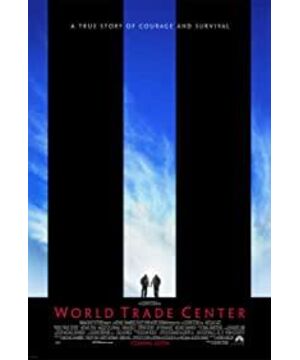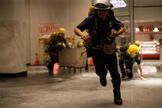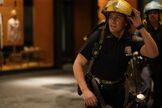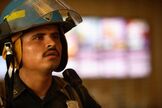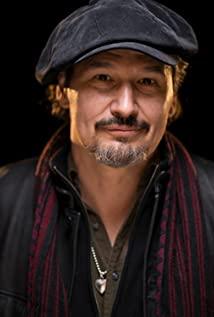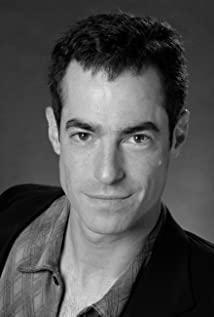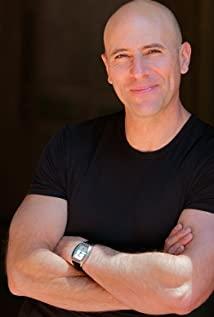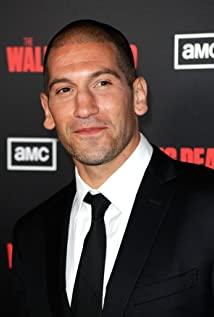What do you expect to see: As in news or documentaries, the big scenes of planes crashing into buildings and buildings crashing down will be truly and shockingly displayed in the movie through special effects? Whether you are watching the excitement or wanting to be there, you will be disappointed. In this movie, there is no thrilling moment of the plane crashing into the building, and there is no even the figure of the plane, only the plane passing by the projection in the city, the vibration and the smoke of the building when it hits the explosion from a long distance; no building collapses. For a moment, there was only the indirect feeling of the police buried underneath. The film's obvious "avoid the important and the lighter" is probably one of the reasons for dissatisfaction. Regardless of the audience's intentions, as a filmmaker, to express the sincerity of himself and the film, he should be sincere and brave to face and express real historical events. This is pretty good to a large extent, but it doesn't mean that you have to uncover the scars every time. Why do you have to show the nightmare once again, especially for those who have experienced it. This is not to say forgetting or escaping, reflection and education are not in the picture at that moment, let alone you have seen it early and comprehensively.
If you expect to see the people under attack, their panic, despair, survival instinct, and so on, I am afraid you will be disappointed again. The most exciting scene in the film is probably someone leaping down from upstairs. But obviously, the performance of the attacked was very little, and there was no "exciting" TV news at all. As mentioned above, in the film, the director did not exaggerate and refine the event artistically, but rather deliberately dilute it. If this is done well, the same effect can be achieved, and even a higher level of "silent is better than sound" (but the director's processing is not perfect, which will be discussed below). But this kind of treatment is no small blow to the general audience. Because ordinary viewers watch disaster movies (of course, "The World" is not a typical disaster movie), they will undoubtedly look at two points: one is the disaster reproduced by special effects, and the other is the people under the disaster. The former satisfies the visual enjoyment, while the latter supplements the monotonous emotions of the masses. Especially in the latter, what people want to see most is people, but what they want to see is not the ordinary and trivial that they have experienced, so the ones that few people have experienced are attractive. The love of sea and stone, the good and evil in disasters, and the instinct and excitement to survive are all like this in "Titanic", "Tornado", and "Burning Skyscrapers". But such sensitive and important events as "911" obviously cannot be handled like ordinary commercial movies. The details of this film are related to the director's personal thoughts and artistic expression.
You probably expect to see the heroic performance of those heroes under such a disaster. You saw the police rushing into the building voluntarily, the former marines who gave up their jobs and came to rescue voluntarily, the rescuers who went into the rubble regardless of their lives, and the long lines on the rubble to transport the wounded. All kinds of people wait, but these are not the main points. The most important feature of the film is two police officers who rushed into the building, but were buried by the collapsed building before they did anything. Are they heroes? certainly! They are heroes from the earth. But if it is to show "heroic qualities", obviously there are more suitable candidates, such as the firefighters who lost the most, or those who really participated in the rescue and sacrificed. Then why are they? Because what the director wants to express is not a "hero", but a "human". A truly pure person, no matter what occupation or status, whether saving someone or waiting to be rescued, whether on the front line at the scene, or shocked or anxiously waiting elsewhere.
Therefore, what the director wants to express is not “heroes”, not restoring the truest history, not exposing the various forms of human nature, but “people”. From the perspective of the most essential person, to see and reappear that unforgettable disaster. And because of the need to express "people", the director has to play down other elements that "define" and "restrict" people in the film. But it is impossible for other elements to have no effect on "people". What's more, in such a major event, there are too many aspects that can be expressed and are worthy of expression. This makes the director unable to completely avoid it, and it can even be said that the director himself cannot give up. Therefore, the inability to abandon on the one hand, and the director's efforts to abandon on the other, led to the relative plainness of the film and the embarrassment everywhere.
View more about World Trade Center reviews


